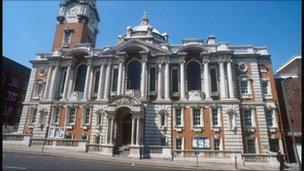Spending Review: What can London expect?
- Published

Town halls across London can expect total cuts of about £5bn
It began with the emergency budget in June and the drumbeat has been growing steadily louder since.
Bash out the sound of austerity consistently and for long enough, hopes the coalition, and the impact of the real thing - the Spending Review - may not seem quite so bad.
In one sense, perhaps, it won't be.
Although the mood created has been one of imminent doom and collapse, the world will not stop, of course.
There is scope for small mercies - if not rabbits out of hats, then at least gerbils.
Besides, it may be people are already in denial about it all. According to one recent survey, many are unaware of what the approaching scythe could do to their local council services.
That is the nature and purpose of expectation management in the short term. And it is in the short term that most of us think.
But it is in the long term where the detail of the Spending Review will have its impact, and where the decisions taken could leave lasting marks on the capital.
Many of the cuts will not start hitting home until next year.
And by the following year, and the year after that, the people running London's town halls will be really scratching their heads, looking at ways of doing things never contemplated before.
London Councils - which represents the capital's 32 local authorities - expects budgets to be reduced by about a quarter in the next four years.
This represents more than £5bn being removed from their coffers.
Blunt instrument
The complaint from some councils is about the bluntness of the instrument, as much as the level of pain.
It has been wielded too indiscriminately, too baldly - it is too simplistic, they complain.
Others, of course, see this as a heaven-sent opportunity to redefine the municipal contract with Londoners, and to reform services forever.
Londoners know they will suffer disproportionately from changes already announced, like imposing a cap on housing benefit and the removal of child benefit from households where one person earns more than £44,000.

The Crossrail project is expected to cost £16bn
Now they are about to learn how much the coalition values infrastructure investment in the capital, and whether £16bn Crossrail and a modernised Tube network are assured.
They will wonder, despite inevitable mayoral protestations, whether these will happen without hefty fare rises and reining back bus services.
They will see signs, or not, that despite hard times, investment will continue to address the dire shortage of affordable housing.
And they will find out if promises are likely to be kept on continued community policing - getting uniformed officers out there, visible in local neighbourhoods - when we know anti-terrorism is to make first call on the limited money available.
However, London has a small public sector, relative to the wealth generated in the capital, and a dynamic private sector which, history tells us, finds opportunities in crises.
The theory is that the private will fill the gap left by the public. And growth will return, hurrah.
That, at least, is the theory.
- Published19 October 2010
- Published19 October 2010
- Published18 October 2010